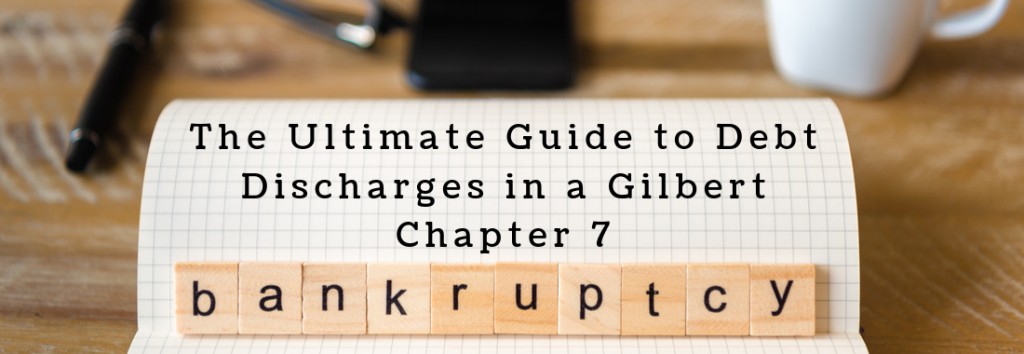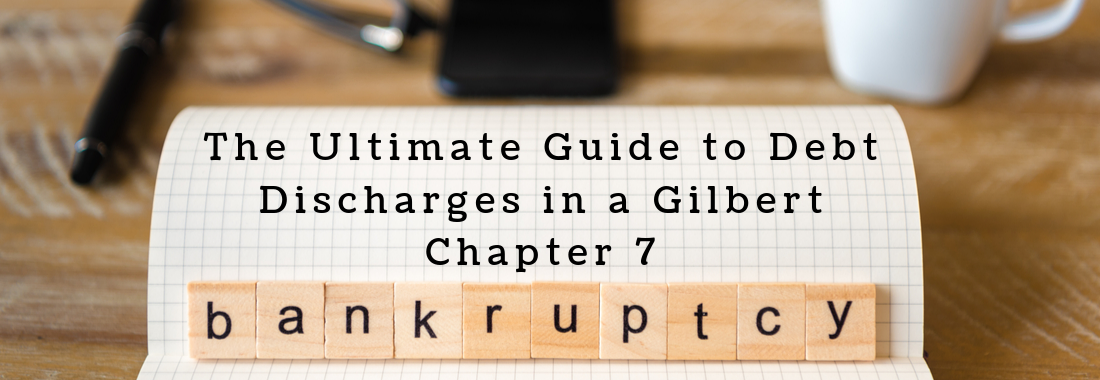The Ultimate Guide to Debt Discharges in a Gilbert Chapter 7 Bankruptcy
Filing for bankruptcy can be a smart financial move and the best way to deal with overwhelming debt. Within just a few months, you can be free of all your unsecured debt, such as credit cards and personal loans. You don’t have to worry about creditors calling and harassing you all the time, and you don’t have to stress about how you’re going to come up with the money to pay your bills each month.
Chapter 7 bankruptcy can offer you the maximum debt relief if you qualify. Here’s what you need to know about debt discharge in a Gilbert Chapter 7 bankruptcy:
Understanding the Debt Discharge
“Debt discharge” is industry speak for the elimination of debt in a bankruptcy filing. When a debt is discharged, you no longer have to pay for it. Creditors no longer have the right to ask you to pay, and they have no recourse for collecting, such as garnishing wages.
In a Chapter 7 bankruptcy, most unsecured debts are discharged. In a Chapter 13 bankruptcy, debts are reorganized under a repayment plan that lasts three to five years. You may be able to discharge some of the debt at the end of the plan, but the focus is on repayment.
What Debts are Discharged under Chapter 7
Chapter 7 bankruptcy focuses on unsecured debts. These are the debts that are not backed by collateral, such as the home or vehicle you are financing or the valuables you put down for a pawn loan. The most common type of unsecured debt is a credit card balance. Other unsecured debt includes medical bills and personal loans.
There is no limit on the amount of debt that can be discharged under a Chapter 7 bankruptcy. That means that if you have run up excessive debts, filing for bankruptcy can give you a fresh start.
Debts that are Not Discharged under Chapter 7
You can’t discharge all your debts with a Chapter 7 bankruptcy filing. There are some debts you can’t ever get out of paying. At the top of the list are debts you owe to the government, such as student loans, back taxes, and criminal fines and restitutions. You also won’t be able to discharge any money you owe for alimony or child support. You’ll have to talk to an attorney about filing a modification for those orders if you are not able to pay.
Even though Chapter 7 bankruptcy can’t discharge these debts, it can still free up the money for you to pay them. Without having to pay those credit card or medical bills, you will have more money each month that you can funnel into your secured debts and those that can’t be discharged. You can even catch up on the back amount that you owe. That can save you from piling up more fines and penalties, as well as from facing any more serious consequences (such as going to jail if you don’t pay your child support, among other things).
Filing for Chapter 7 bankruptcy can give you the fresh start you need after becoming mired in debt with seemingly no way out. It’s important that you meet with a bankruptcy lawyer to talk through your options and find out whether Chapter 7 or Chapter 13 bankruptcy would be right for you. You should choose the option that will give you the maximum debt relief so that you can move forward quickly, free of as much debt as possible. Your attorney will help you get on a fast (er) track to the life you have been wanting.
Gilbert Bankruptcy Lawyers can help you determine how bankruptcy can help you get the debt relief you want. Our dedicated attorneys will analyze your personal finances to help you understand whether you qualify for Chapter 7 bankruptcy protection and what you can expect. We can put an end to the harassing phone calls you’ve been receiving, wage garnishment, and more. If you need to file for Chapter 13 bankruptcy, we’ll help you get an affordable repayment plan that will it easier for you to regain control of your finances. Call us in Gilbert today to talk to an experienced bankruptcy attorney who’s ready to help you.
Published By:
Gilbert Bankruptcy Lawyers
Office: 480-448-9800
Website: https://gilbertbankruptcylawyers.com

